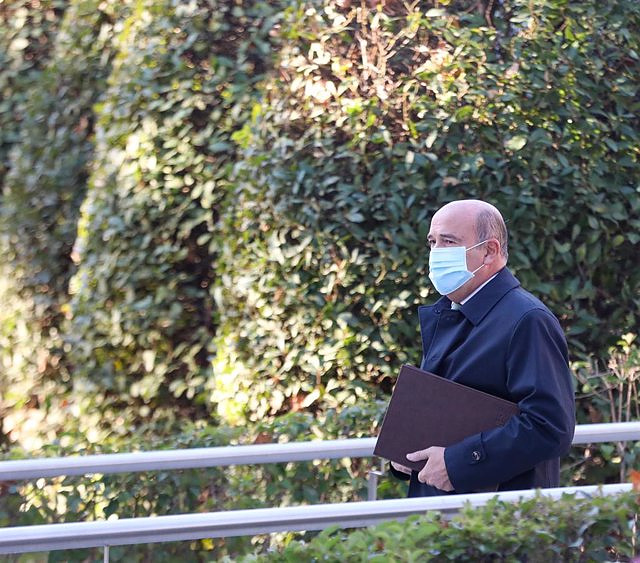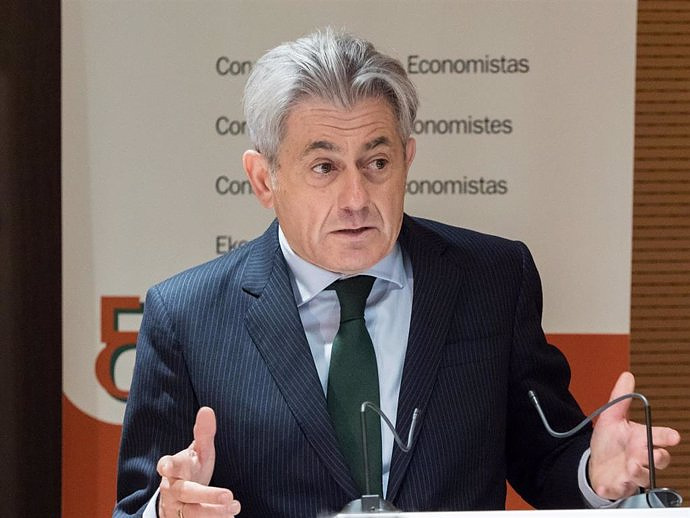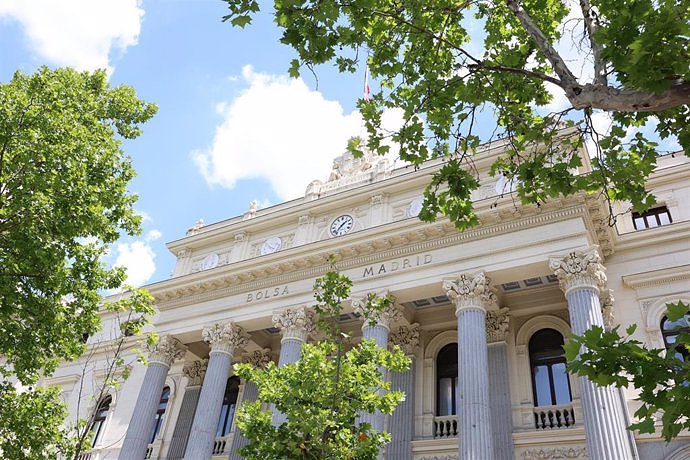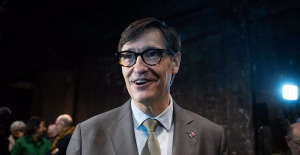He says that there are also "the reasons" for Robles' proposal regarding the colonel's suitability
The Supreme Court (TS) ruled in favor of Civil Guard Colonel Diego Pérez de los Cobos, in his appeals for his non-promotion to brigadier general, considering that the director of the Benemérita did not comply with the required procedure of issuing a "own report" because the document provided is limited to paraphrasing the law and transferring the evaluation carried out by the Superior Council of the Civil Guard, without making an "own evaluation."
This is stated by the Contentious-Administrative Chamber in a ruling, presented by Judge José Luis Requero, whose ruling was already announced on September 19. This is the first of three resolutions, which are expected in similar terms, since Pérez de los Cobos challenged the three royal decrees with the appointments in which he was not included.
The Supreme Court upholds the colonel's appeal, annulling said appointments and ordering the actions to be taken back to the moment prior to the report that the director of the Armed Institute must submit to the Minister of Defense, evaluating the evaluation carried out by the Superior Council of the Civil Guard on the suitability of those are going to be promoted, the order of priority and the procedure followed.
The Third Chamber explains that, although the director of the Civil Guard provided said report, she limited herself to saying that "in compliance with the provisions of article 67 of Law 29/2014, of November 29, on the Civil Guard Personnel Regime , raises the result of the evaluation carried out by the Superior Council, informing that, for the purposes of article 73 of said Law, the suitability of the positions or vacant positions to be filled for promotions will be taken into account.
"Reading it is enough to deduce that it paraphrases article 67.2 of the LRPGC, it is not the transmission of an opinion, but the mere transfer of the work of the Superior Council of the Civil Guard, without assessing the greater suitability of an applicant with respect to the concepts of suitability considered by the regulations set out above to decide the promotion," says the Supreme Court.
The magistrates emphasize that "this report cannot remain in an act of referral of the evaluation carried out by the Superior Council of the Civil Guard, but rather the general director of the Civil Guard must make his own assessment of both the result of the evaluations and "the elements that are considered necessary for the Council of Ministers to decide and assess the suitability of the promoted person in office".
To this the Supreme Court adds that, even in the event that the director of the Benemérita has acted in that way because "she assumes what was done by the Superior Council of the Civil Guard", "all the more reason that 'her own report' would be required" .
And that's because Pérez de los Cobos "enjoyed a preferential position in the classification and the order resulting from the final evaluation was a consequence of not applying the evaluation procedure to him in the 2021/2022 cycle, when it benefited him, as in the previous 2020 cycle. 2021, which was applied to him when it was detrimental to him, then it was not possible to simply assume that evaluation without ruling on the application of the evaluation procedure."
"For this reason, the general director of the Civil Guard, when reporting, must verify whether this change of procedure is in accordance with the principles of objectivity, effectiveness and transparency," the magistrates state.
Furthermore, the Supreme Court points out that, "after the intervention of the general director of the Civil Guard, there are no reasons for the proposal of the Minister of Defense (Margarita Robles) regarding the suitability of the promoted colonel for the specific vacancy that determines the promotion." ".
FROM NUMBER ONE TO NUMBER 4
On the other hand, the TS downplays the fact that Pérez de los Cobos was not promoted to brigadier general despite the fact that he was at the top of the ranking.
As detailed, in the contested promotion cycle (2021/2022) Pérez de los Cobos was classified as number 1 but, "when the evaluation procedure was applied", in the final result he was number 4 and the first three were three colonels located in positions 2, 6 and 7".
The Third Chamber points out that, "from the evidence carried out, it is deduced that the colonels who appear in first place in the final order of the final evaluation are not always promoted in the first evaluation of the corresponding promotion cycle", but rather they do so " in a subsequent cycle or after finishing number 2 in the cycle in which they are promoted".
Thus, it resolves that "such classification is not determining the promotion decision, it does not cancel or, at least, predetermine the power of proposal of the general director of the Civil Guard and the Ministry of Defense, nor the decision-making power of the Council of Ministers ", despite the fact that "its value is obvious and requires consideration."
Consequently, he reasons that "it is not possible to invoke a kind of practice or use in the regime of promotions to brigadier general as enervating the meaning and discretionary nature of the power exercised by the Council of Ministers", so "there is also no warning in the actions of the then general director of the Civil Guard the misuse of power alleged by the plaintiff".
For the Supreme Court, the director of the Benemérita "exercised her power for the purpose provided for in the regulation that empowered her to do so", although she emphasizes that "a different thing is that in exercising that power she has infringed the regulations."
In fact, he criticizes not only the lack of an "own assessment" in the aforementioned report, but also perceives a "procedural disloyalty" because the text was not sent to the Supreme Court as part of the administrative file, but rather the State Attorney's Office he later contributed in his answer to the lawsuit.
THE CESSATION HAD "OBVIOUS RELEVANCE"
The high court also places a magnifying glass on the dismissal of Pérez de los Cobos as head of the Madrid Command - which was finally annulled by the Supreme Court itself, forcing the colonel's reinstatement in office - "due to his projection in the two promotion cycles, it also has an obvious relevance that makes it unique and qualifies".
"This fact affects the lawsuit in such a way that the irregularities noted are more than mere formal or procedural infractions, especially after this court has definitively annulled that dismissal in which a serious illegality was committed regarding facts that are not the case. remember," says the TS.
Consequently, the magistrates emphasize that, "ignoring what is common practice in these procedures, it was necessary to dispel any hint of arbitrariness."
It should be remembered that this is Pérez de los Cobos' second victory in the Supreme Court. Last March, he annulled his dismissal as head of the Madrid Command, which occurred in May 2020, within the framework of a judicial investigation - later archived - into the possible connection of the feminist demonstration of the 8th. M and the expansion of the coronavirus.
The colonel alleged that his dismissal was a "direct consequence of not having agreed to carry out an openly illegal act", as would have occurred in the case of "informing the political leaders of the Ministry of the Interior of an investigation subject to the strictest confidentiality." .

 Exploring Cardano: Inner Workings and Advantages of this Cryptocurrency
Exploring Cardano: Inner Workings and Advantages of this Cryptocurrency Seville.- Economy.- Innova.- STSA inaugurates its new painting and sealing hangar in San Pablo, for 18 million
Seville.- Economy.- Innova.- STSA inaugurates its new painting and sealing hangar in San Pablo, for 18 million Innova.- More than 300 volunteers join the Andalucía Compromiso Digital network in one month to facilitate access to ICT
Innova.- More than 300 volunteers join the Andalucía Compromiso Digital network in one month to facilitate access to ICT Innova.-AMP.- Ayesa acquires 51% of Sadiel, which will create new technological engineering products and expand markets
Innova.-AMP.- Ayesa acquires 51% of Sadiel, which will create new technological engineering products and expand markets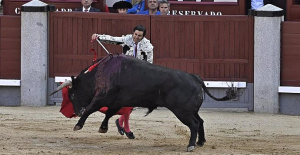 The Community will provide facilities and support to the Bullfighting Prize with the help of the Toro de Lidia Foundation
The Community will provide facilities and support to the Bullfighting Prize with the help of the Toro de Lidia Foundation Page will contact the bullfighting sector to create, from C-LM, Bullfighting Awards that will have national reach
Page will contact the bullfighting sector to create, from C-LM, Bullfighting Awards that will have national reach Urtasun, on eliminating the National Bullfighting Award: "The majority of Spaniards support the decision I have made"
Urtasun, on eliminating the National Bullfighting Award: "The majority of Spaniards support the decision I have made"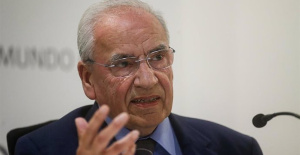 Alfonso Guerra sees Sánchez in an "autocratic" drift and accuses him of generating division "between the two Spains"
Alfonso Guerra sees Sánchez in an "autocratic" drift and accuses him of generating division "between the two Spains" How Blockchain in being used to shape the future
How Blockchain in being used to shape the future Not just BTC and ETH: Here Are Some More Interesting Coins Worth Focusing on
Not just BTC and ETH: Here Are Some More Interesting Coins Worth Focusing on The Generalitat calls for aid worth 4 million to promote innovation projects in municipalities
The Generalitat calls for aid worth 4 million to promote innovation projects in municipalities UPV students design an app that helps improve the ventilation of homes in the face of high temperatures
UPV students design an app that helps improve the ventilation of homes in the face of high temperatures Ivace and promotes a less invasive device for the early detection of prostate cancer
Ivace and promotes a less invasive device for the early detection of prostate cancer Valencia unanimously approves the ordinance to allocate spaces to test innovative initiatives
Valencia unanimously approves the ordinance to allocate spaces to test innovative initiatives A million people demonstrate in France against Macron's pension reform
A million people demonstrate in France against Macron's pension reform Russia launches several missiles against "critical infrastructure" in the city of Zaporizhia
Russia launches several missiles against "critical infrastructure" in the city of Zaporizhia A "procession" remembers the dead of the Calabria shipwreck as bodies continue to wash up on the shore
A "procession" remembers the dead of the Calabria shipwreck as bodies continue to wash up on the shore Prison sentences handed down for three prominent Hong Kong pro-democracy activists
Prison sentences handed down for three prominent Hong Kong pro-democracy activists ETH continues to leave trading platforms, Ethereum balance on exchanges lowest in 3 years
ETH continues to leave trading platforms, Ethereum balance on exchanges lowest in 3 years Investors invest $450 million in Consensys, Ethereum incubator now valued at $7 billion
Investors invest $450 million in Consensys, Ethereum incubator now valued at $7 billion Alchemy Integrates Ethereum L2 Product Starknet to Enhance Web3 Scalability at a Price 100x Lower Than L1 Fees
Alchemy Integrates Ethereum L2 Product Starknet to Enhance Web3 Scalability at a Price 100x Lower Than L1 Fees Mining Report: Bitcoin's Electricity Consumption Declines by 25% in Q1 2022
Mining Report: Bitcoin's Electricity Consumption Declines by 25% in Q1 2022 Oil-to-Bitcoin Mining Firm Crusoe Energy Systems Raised $505 Million
Oil-to-Bitcoin Mining Firm Crusoe Energy Systems Raised $505 Million Microbt reveals the latest Bitcoin mining rigs -- Machines produce up to 126 TH/s with custom 5nm chip design
Microbt reveals the latest Bitcoin mining rigs -- Machines produce up to 126 TH/s with custom 5nm chip design Bitcoin's Mining Difficulty Hits a Lifetime High, With More Than 90% of BTC Supply Issued
Bitcoin's Mining Difficulty Hits a Lifetime High, With More Than 90% of BTC Supply Issued The Biggest Movers are Near, EOS, and RUNE during Friday's Selloff
The Biggest Movers are Near, EOS, and RUNE during Friday's Selloff Global Markets Spooked by a Hawkish Fed and Covid, Stocks and Crypto Gain After Musk Buys Twitter
Global Markets Spooked by a Hawkish Fed and Covid, Stocks and Crypto Gain After Musk Buys Twitter Bitso to offset carbon emissions from the Trading Platform's ERC20, ETH, and BTC Transactions
Bitso to offset carbon emissions from the Trading Platform's ERC20, ETH, and BTC Transactions Draftkings Announces 2022 College Hoops NFT Selection for March Madness
Draftkings Announces 2022 College Hoops NFT Selection for March Madness